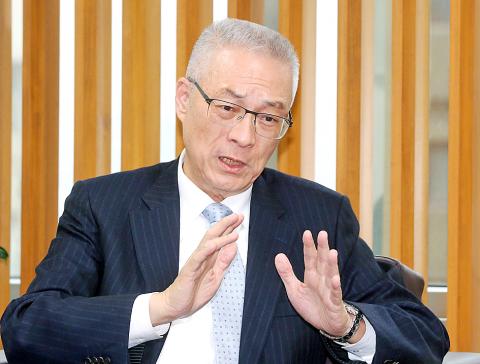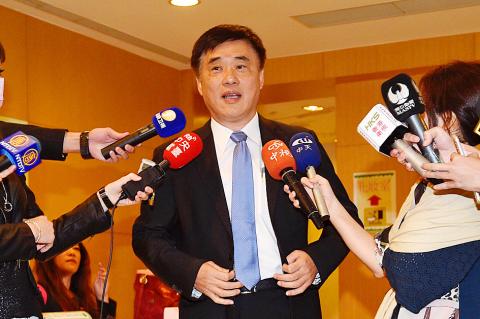Chinese Nationalist Party (KMT) Chairwoman Hung Hsiu-chu (洪秀柱) might face at least two challengers in the party’s chairperson election in May, as former vice president Wu Den-yih (吳敦義) and KMT Vice Chairman Hau Lung-bin (郝龍斌) are expected to announce their bids at separate news conferences on Monday.
Wu, who briefly served as interim KMT chairman in December 2014 after then-party leader Ma Ying-jeou (馬英九) stepped down over an electoral defeat, yesterday confirmed, although ambiguously, that he is interested in vying for the KMT chairmanship.
“Despite being only an opposition party at the moment, the KMT must nevertheless do its utmost to scrutinize the ruling party to ensure that our nation can continue to improve and develop. Many of my fellow party members are looking to me to fulfill those expectations,” Wu said yesterday.

Photo courtesy of the Taipei Photojournalist Society
Wu said as both the nation and the party had offered him significant assistance when he served as KMT vice chairman, premier and lawmaker, he must “shoulder a portion of the burden of responsibility” when the party is in distress.
“That is why I must give serious consideration [to joining the chairperson race]. I shall have some news for you on Monday,” Wu said.
Wu’s office later announced that the former vice president will hold a news conference at 10am on Monday to make an announcement, but did not disclose what the conference would address.

Photo: George Tsorng, Taipei Times
Meanwhile, at a public forum in Taipei yesterday, Hau said he will make an announcement once he makes up his mind, after he was asked whether he intends to run for the KMT chairmanship.
The more people join the chairmanship race the better, Hau said.
It was later rumored that Hau also plans to announce his candidacy on Monday.
When reached for verification, Hau’s office neither confirmed nor denied the rumor, saying only that more information might be released today.
The KMT’s upcoming chairperson election has been dogged by controversy since the party headquarters last month unexpectedly moved forward the race from July 20 to May 20, before passing the decision through a meeting of the KMT’s Central Standing Committee without a quorum.
Hung announced that she will run for re-election during an interview with the Chinese-language United Daily Evening News published on Sunday last week, when she said she “has an incurable sense of mission toward the KMT and cross-strait ties.”
Hung was elected party chairwoman on March 26 last year to serve the remaining term of the KMT’s sixth chairman, Ma, who won re-election on July 20, 2013, before stepping down on Dec. 3, 2014, to take political responsibility for the KMT’s defeat in the nine-in-one elections that year.
Ma was succeeded by New Taipei City Mayor Eric Chu (朱立倫) on Jan. 19, 2015, who resigned on Jan. 16 last year after losing the presidential race to the Democratic Progressive Party’s Tsai Ing-wen (蔡英文).

MAKING WAVES: China’s maritime militia could become a nontraditional threat in war, clogging up shipping lanes to prevent US or Japanese intervention, a report said About 1,900 Chinese ships flying flags of convenience and fishing vessels that participated in China’s military exercises around Taiwan last month and in January last year have been listed for monitoring, Coast Guard Administration (CGA) Deputy Director-General Hsieh Ching-chin (謝慶欽) said yesterday. Following amendments to the Commercial Port Act (商港法) and the Law of Ships (船舶法) last month, the CGA can designate possible berthing areas or deny ports of call for vessels suspected of loitering around areas where undersea cables can be accessed, Oceans Affairs Council Minister Kuan Bi-ling (管碧玲) said. The list of suspected ships, originally 300, had risen to about

DAREDEVIL: Honnold said it had always been a dream of his to climb Taipei 101, while a Netflix producer said the skyscraper was ‘a real icon of this country’ US climber Alex Honnold yesterday took on Taiwan’s tallest building, becoming the first person to scale Taipei 101 without a rope, harness or safety net. Hundreds of spectators gathered at the base of the 101-story skyscraper to watch Honnold, 40, embark on his daredevil feat, which was also broadcast live on Netflix. Dressed in a red T-shirt and yellow custom-made climbing shoes, Honnold swiftly moved up the southeast face of the glass and steel building. At one point, he stepped onto a platform midway up to wave down at fans and onlookers who were taking photos. People watching from inside

Japan’s strategic alliance with the US would collapse if Tokyo were to turn away from a conflict in Taiwan, Japanese Prime Minister Sanae Takaichi said yesterday, but distanced herself from previous comments that suggested a possible military response in such an event. Takaichi expressed her latest views on a nationally broadcast TV program late on Monday, where an opposition party leader criticized her for igniting tensions with China with the earlier remarks. Ties between Japan and China have sunk to the worst level in years after Takaichi said in November that a hypothetical Chinese attack on Taiwan could bring about a Japanese

STREAMLINED: The dedicated funding would allow the US to transfer equipment to Taiwan when needed and order upgraded replacements for stockpiles, a source said The US House of Representatives on Thursday passed a defense appropriations bill totaling US$838.7 billion, of which US$1 billion is to be allocated to reinforcing security cooperation with Taiwan and US$150 million to replace defense articles provided to the nation. These are part of the Consolidated Appropriation Act, which the US House yesterday passed with 341 votes in favor and 88 against. The act must be passed by the US Senate before Friday next week to avoid another government shutdown. The US House Committee on Appropriations on Monday unveiled the act, saying that it allocates US$1 billion for the Taiwan Security Cooperation Initiative